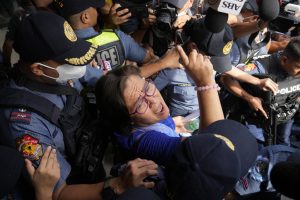A Philippine court yesterday rejected a request for bail by Leila De Lima, the country’s most prominent political prisoner, despite the mounting evidence that the charges against her were politically motivated.
De Lima, a former opposition senator and justice secretary, has been detained since 2017 on drug charges she says were fabricated to stop her from pursuing a Senate investigation into then President Rodrigo Duterte’s deadly “war on drugs.”
According to The Associated Press, Manila Regional Trial Court Presiding Judge Romeo Buenaventura rejected de Lima’s argument in her request for bail that prosecutors failed to prove that she conspired with co-defendants and received payoffs from the trafficking of narcotics within the country’s prison system during the 2010-16 administration of President Benigno Aquino, when she was justice secretary.
“This court is convinced that there is a great probability that the crime charged has been committed and that the accused are the agents thereof,” Buenaventura said in his ruling.
In February 2017, De Lima surrendered herself to the police after prosecutors filed criminal charges alleging her involvement in drug trafficking within the prison system. The political motivations of the charges were fairly self-evident. Prior to her arrest, de Lima served as chair of the Senate Committee on Justice and Human Rights, in which capacity she had begun a public inquiry into the thousands of extrajudicial killings believed to have been committed under Duterte’s anti-drugs campaign.
Prior to Duterte’s election in 2016, she also chaired the government’s Commission on Human Rights in which capacity she spearheaded investigations of the activities of “death squads” in Davao City in the southern Philippines, where Duterte was mayor for more than two decades.
As Duterte’s term came to an end last year, however, the cases against her began to disintegrate after key witnesses recanted their allegations against her. In April of last year, Kerwin Espinosa, a self-confessed drug lord who testified against the De Lima, issued an affidavit and apology saying that his statements were the result of “pressure, coercion, intimidation and serious threats to his life and his family.”
The following week, Rafael Ragos also retracted earlier testimony in which he claimed that as an officer-in-charge of the Bureau of Corrections, he had delivered money on two occasions to De Lima’s home as instructed by a prisoner in 2012. Ragos said that his testimony was coerced by Duterte’s justice secretary Vitaliano Aguirre. “I was forced to cooperate with Sec. Aguirre and the DOJ public prosecutors by agreeing to deliver all these false testimonies and sign false affidavits against Sec. De Lima and Ronnie Dayan,” he said.
The recantations led De Lima to be acquitted in the second of three drug cases against her last month, following an acquittal on the first charge in February 2021, on the basis of weak evidence. After these retractions, De Lima’s defense team petitioned for bail on the outstanding charge, arguing that she faced real dangers while in custody at the Philippine National Police headquarters in Manila. Last October, she was taken hostage by three Muslim militants in their failed attempt to escape from prison.
In its ruling yesterday, the court described the hostage incident as “an isolated occurrence” that did not warrant her release on bail.
Why these retractions did not lead to an immediate dismissal of all of the charges against De Lima, or at least to her release on bail while the final cases move through the system, speaks poorly of the state of the Philippine judiciary.
In a statement, Carlos Conde of Human Rights Watch said that the court decision “prolongs the injustice committed against her since more than six years ago.”
“This flies in the face of her previous court acquittal in two cases which clearly showed the political nature of her persecution,” he said.
Rep. Arlene Brosas added yesterday that the government “cannot deny that these charges are politically motivated and that her investigations into the extrajudicial killings are the reason why she was charged with trumped-up cases.”

































